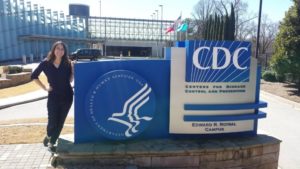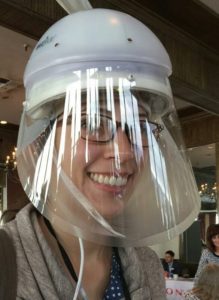Public Health Analyst Series: Laura’s Journey
The me of ten years ago never would have predicted the career that I have now. Ten years ago, I was majoring in mathematics and economics at the University of California San Diego, on track to become a retirement actuary. I took a class on the US healthcare system to fulfill one of my general education requirements, and the professor assigned us a paper on a local healthcare organization of our choice. I shadowed clinic workers at Family Health Centers of San Diego for the paper and fell in love with public health. While I felt like I could help people as a retirement actuary, I felt I could make a difference with public health and connect with the populations I served. I volunteered with the clinic for the remainder of my time in college.

Graduating with my Masters of Public Health in Epidemiology and Biostatistics from the University of California, Berkeley
After graduation, I didn’t know how to combine my interest in health with my analytical major until a chance conversation with another clinic volunteer introduced me to epidemiology, the study of determinants and distribution of disease. I realized that to get the kind of job I wanted in public health, I would need to go to graduate school. So, at the height of the recession, I temped, worked part-time, and attended night classes in public health to get into a graduate program in epidemiology and biostatistics at University of California, Berkeley.

At the Centers for Disease Control and Prevention main campus in Atlanta.
Since earning my Master of Public Health degree, I have worked as an epidemiologist with the City of Berkeley Public Health Division, California Department of Public Health, and Centers for Disease Control and Prevention. I loved working as an epidemiologist, but felt severely limited by the quality of the data I worked with. I spent most of my time cleaning and deduplicating data, only to have my analyses limited by underlying data accuracy and completeness issues. Most of the issues I observed stemmed from lack of standards: a missed section on a paper form, 20 different spellings and abbreviations of the same word in a free-text field, an accidentally checked box in an electronic form, or a duplicated record in a system without any built-in quality control processes.

Trying on a fancy respirator for working with tuberculosis patients at a trade show; unfortunately, you can’t hear anything with it on.
These data issues needed to be fixed at the data source, and my familiarity with the issues drove me to work in high-level data governance at Lantana. Lantana influences national policy for standards-based health data exchange. As a public health analyst, I use analysis, quality assurance, and best practices in data governance to ensure that clients report electronic health data in a standardized, structured way. I hope that my efforts will enable others to do more meaningful research and analysis and ultimately improve public health.